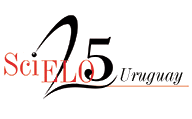Reflections about the «theory of the catholic ghetto» in a secular Uruguay
DOI:
https://doi.org/10.25185/14.4Keywords:
Catholicism, Secularization, SecularismAbstract
The renewed perspective about the concept of secularization promoted in recent years by various social scientists —particularly historians and sociologists— has questioned the classical interpretation as an irreversible and univocal process whose final goal was the disappearance of religion or its retreat into the private area. Instead, among other issues, the multidimensional nature of the concept has been raised, emphasizing the reconstruction of the religious field through a new relationship dynamic between the public space, the faithful and "the others" (liberal, socialist, anarchist, etc). This theoretical renewal allowed new readings to be made on the process itself in Uruguay, and to question various approaches, many of them deeply rooted in local historiography, such as the “Catholic ghetto theory”. The present article intends to reflect on this concept and how it permeated the historiographic interpretations of the role of Catholicism —the Church and the faithful— in a secular Uruguay.
Downloads
References
Arboleda Mora, C. “Ghetto o cruzada. Deslaicizar la laicidad”, Veritas: revista de filosofía y teología. N°29, 2013(2013)
Baubérot, J. Histoire de la laicite en Fnrace. Paris: Que sais-je?, 2017.
Blancarte, R. “Laicidad y secularización en México”. En Estudios Sociológicos, vol. XIX núm.3. El Colegio de México, A.C. México, 2001.
Caetano, G. y Geymonat, R. La secularización uruguaya, I. «Catolicismo y privatización de lo religioso». Montevideo: Taurus, 1997.
Clark, CH. y Wolfram, K. Culture wars: secular/catholic conflict 19 century. Cambridge: Cambridge University Press, 2003.
De Santa Ana, J. El proceso de secularización en el Uruguay: sus causas y resultantes. Aspectos religiosos de la sociedad uruguaya (82-105), Montevideo: Centro de Estudios Cristianos de la Federación de Iglesias Evangélicas del Uruguay, 1965.
Di Stefano, R.. “Por una historia de la secularización y de la laicidad en la Argentina”. Quinto Sol, vol.15, nº 1, 2011
Lodewijk, R, Aubert R, Tracy Ellis J, Bruls, J, Crunican, P.E, Aijar, J y Pike F.B. Nueva Historia de la Iglesia. Madrid: Cristiandad, 1977.
Martinez Arona, G. Función de la Iglesia en la Cultura Nacional. Montevideo: Ediciones APOCE, 1966.
Mauro, D. y Martínez, I. Secularización, Iglesia y Política en Argentina. Balance teórico y síntesis histórica. Rosario, Nº 4, 2016.
Methol Ferré, A. Las corrientes religiosas. Montevideo: Colección Nuestra Tierra, n.º 35, 1969.
Rode, P. Promoción del laicado, Montevideo: Cursos de Complementación Cristiana, 1963.
Rodé, P. y Segundo J.L. Presencia de la Iglesia en el Uruguay, Enciclopedia Uruguaya, Montevideo Nº37, 1969.
Segundo, J.L. Función de la Iglesia en la realidad rioplatense, Montevideo: Barreiro y Ramos, 1962.
Sobrado, E. Entre pueblo y oligarquía, Montevideo: Editorial Alfa, 1969.
Published
How to Cite
Issue
Section
License
Copyright (c) 2023 Carolina Greising Díaz

This work is licensed under a Creative Commons Attribution 4.0 International License.



























 This work is under a
This work is under a 